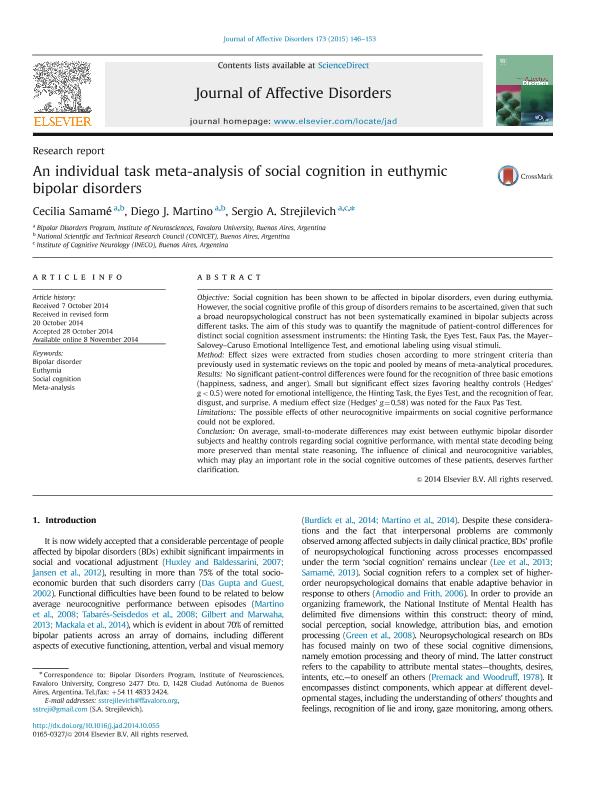Mostrar el registro sencillo del ítem
dc.contributor.author
Samame, Cecilia

dc.contributor.author
Martino, Diego Javier

dc.contributor.author
Strejilevich, Sergio

dc.date.available
2018-03-08T19:32:24Z
dc.date.issued
2015-03
dc.identifier.citation
Samame, Cecilia; Martino, Diego Javier; Strejilevich, Sergio; An individual task meta-analysis of social cognition in euthymic bipolar disorders; Elsevier Science; Journal of Affective Disorders; 173; 3-2015; 146-153
dc.identifier.issn
0165-0327
dc.identifier.uri
http://hdl.handle.net/11336/38292
dc.description.abstract
Objective Social cognition has been shown to be affected in bipolar disorders, even during euthymia. However, the social cognitive profile of this group of disorders remains to be ascertained, given that such a broad neuropsychological construct has not been systematically examined in bipolar subjects across different tasks. The aim of this study was to quantify the magnitude of patient-control differences for distinct social cognition assessment instruments: the Hinting Task, the Eyes Test, Faux Pas, the Mayer-Salovey-Caruso Emotional Intelligence Test, and emotional labeling using visual stimuli. Method Effect sizes were extracted from studies chosen according to more stringent criteria than previously used in systematic reviews on the topic and pooled by means of meta-analytical procedures. Results No significant patient-control differences were found for the recognition of three basic emotions (happiness, sadness, and anger). Small but significant effect sizes favoring healthy controls (Hedgesg<0.5) were noted for emotional intelligence, the Hinting Task, the Eyes Test, and the recognition of fear, disgust, and surprise. A medium effect size (Hedgesg=0.58) was noted for the Faux Pas Test. Limitations The possible effects of other neurocognitive impairments on social cognitive performance could not be explored. Conclusion On average, small-to-moderate differences may exist between euthymic bipolar disorder subjects and healthy controls regarding social cognitive performance, with mental state decoding being more preserved than mental state reasoning. The influence of clinical and neurocognitive variables, which may play an important role in the social cognitive outcomes of these patients, deserves further clarification.
dc.format
application/pdf
dc.language.iso
eng
dc.publisher
Elsevier Science

dc.rights
info:eu-repo/semantics/openAccess
dc.rights.uri
https://creativecommons.org/licenses/by-nc-sa/2.5/ar/
dc.subject
Bipolar Disorder
dc.subject
Euthymia
dc.subject
Meta-Analysis
dc.subject
Social Cognition
dc.subject.classification
Medicina Critica y de Emergencia

dc.subject.classification
Medicina Clínica

dc.subject.classification
CIENCIAS MÉDICAS Y DE LA SALUD

dc.title
An individual task meta-analysis of social cognition in euthymic bipolar disorders
dc.type
info:eu-repo/semantics/article
dc.type
info:ar-repo/semantics/artículo
dc.type
info:eu-repo/semantics/publishedVersion
dc.date.updated
2018-03-08T19:00:01Z
dc.journal.volume
173
dc.journal.pagination
146-153
dc.journal.pais
Países Bajos

dc.journal.ciudad
Amsterdam
dc.description.fil
Fil: Samame, Cecilia. Consejo Nacional de Investigaciones Científicas y Técnicas; Argentina. Universidad Favaloro; Argentina
dc.description.fil
Fil: Martino, Diego Javier. Universidad Favaloro; Argentina. Consejo Nacional de Investigaciones Científicas y Técnicas; Argentina
dc.description.fil
Fil: Strejilevich, Sergio. Universidad Favaloro; Argentina. Instituto de Neurología Cognitiva; Argentina
dc.journal.title
Journal of Affective Disorders

dc.relation.alternativeid
info:eu-repo/semantics/altIdentifier/url/https://www.sciencedirect.com/science/article/pii/S0165032714006879
dc.relation.alternativeid
info:eu-repo/semantics/altIdentifier/doi/http://dx.doi.org/10.1016/j.jad.2014.10.055
Archivos asociados
